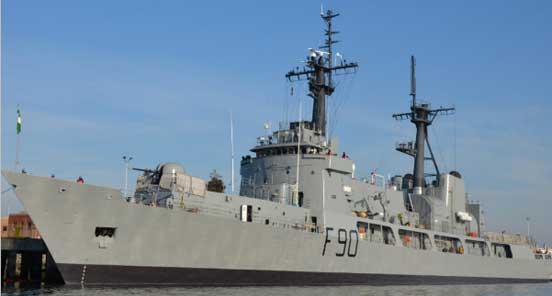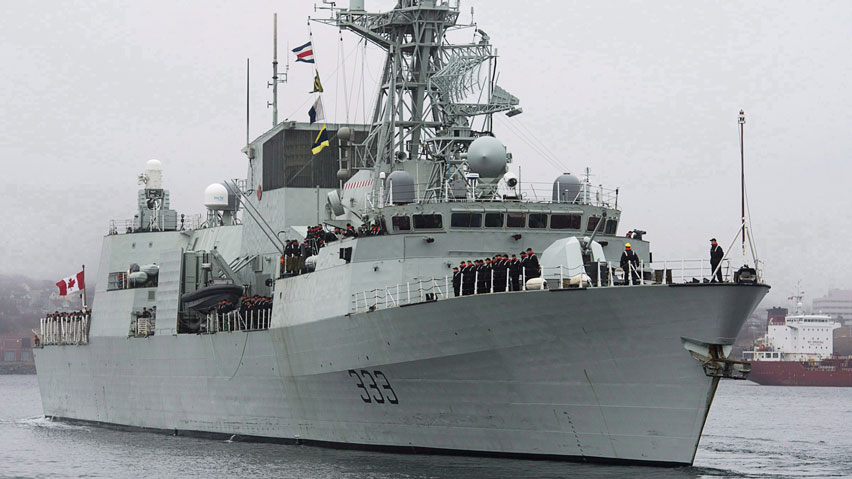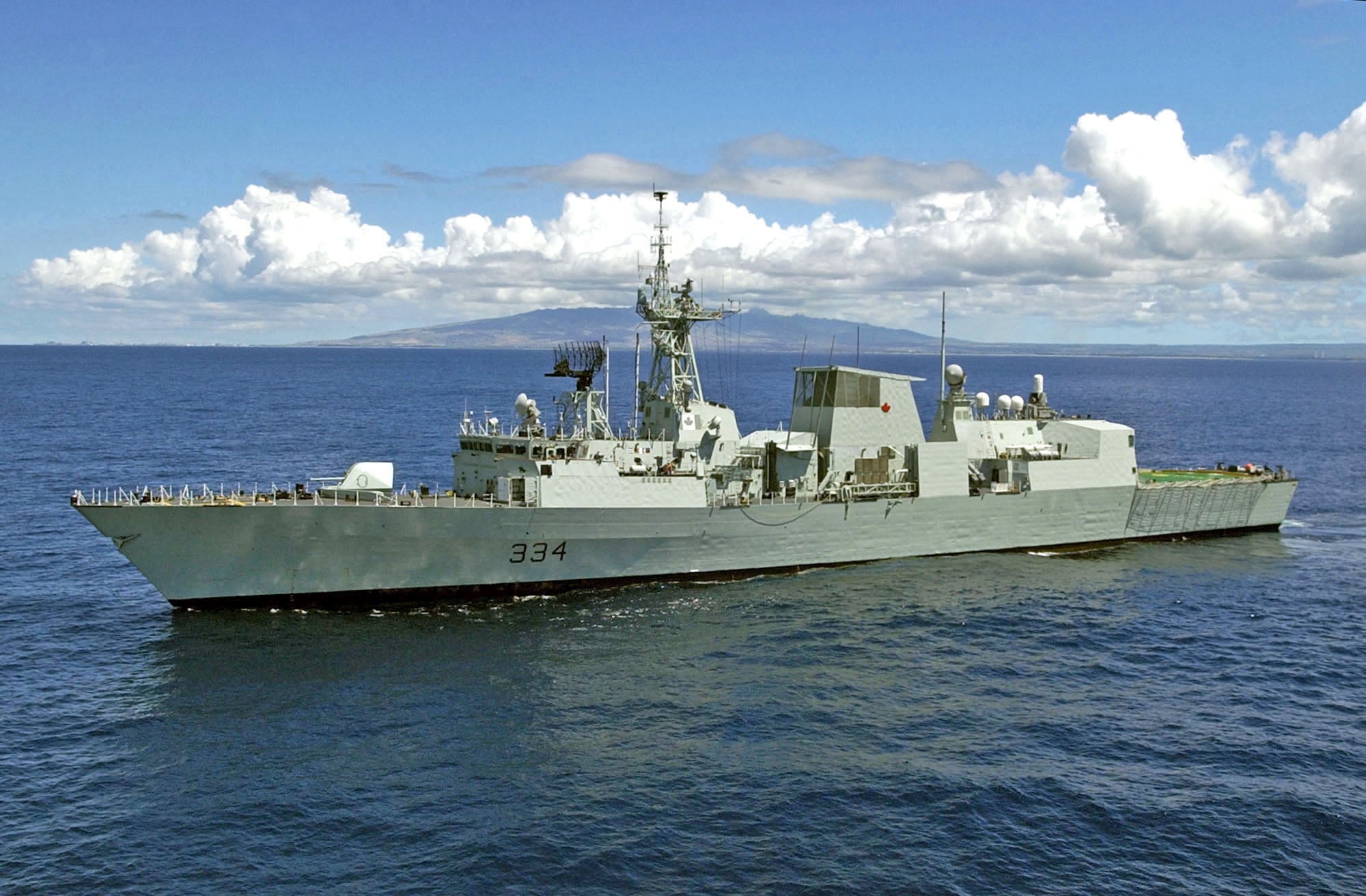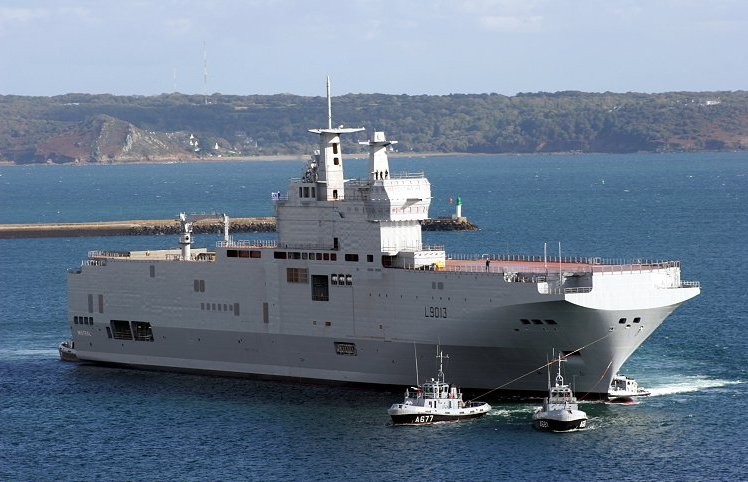With the growing threat of piracy in the Gulf of Guinea, the Nigerian Navy has undergone a period of rapid development, becoming one of Africa’s leading naval powers. Most of the vessels employed in the Nigerian Navy are corvettes and patrol cutters. With the possible exception of the NNS Thunder – a former US Coast Guard cutter provided to Nigeria through the Excess Defence Articles program – these vessels lack the range to participate in expeditionary operations far from West Africa’s waters. For example, Canada’s own Halifax-class frigates can travel much further and faster than the NNS Aradu, a frigate that packs what is arguably the strongest punch in the Nigerian Navy. This focus on short-ranged vessels indicates that Nigeria is principally interested for now in defending its own waters rather than acquiring any form of expeditionary capability.
[captionpix align=”left” theme=”elegant” width=”300″ imgsrc=”http://natoassociation.ca/wp-content/uploads/2013/12/Aradu.jpg” captiontext=”NNS Aradu docked in Lagos, Nigeria.”]
While the development of Nigerian counter-piracy capabilities has been impressive, there have been some unforeseen consequences for regional neighbours. Whereas once pirates thrived by preying on shipping through Nigerian waters, these same groups have since been displaced by the increased patrols. Further to the west, these pirates now ply their criminal trade on the waters off Benin and Togo, which do not enjoy the capabilities of Nigeria’s emerging naval force. This is having an enormously negative impact on the economies of these two small West African countries. For example, due to the increase in vessel insurance premiums for shipping companies using the docks at the Beninese port of Cotonou, vessel traffic there has dropped 70% since 2011. More than half of Benin’s government revenue is drawn from port fees and custom duties, 80% of which comes from Cotonou.
There has been some attempted push-back from the Beninese and Togolese governments. In September 2012, Togolese patrol boats successfully mobilized in time to repel pirates attempting to hijack a Maltese-flagged tanker entering Togolese waters from neighbouring Ghana. Togo has a number of other success stories, frequently involving the protection of tankers traveling eastward from Ghana. Meanwhile, Benin and Nigeria have begun to conduct some joint patrols, though these are limited in scope and number.
There are glaring limits to what Benin and Togo will be able to accomplish on their own in the fight against piracy. According to the best information available, the Togolese Navy currently consists of two patrol boats: the Kara and Mono. Though Nigeria has more substantially more coastline to secure than either Togo or Benin, the contrast in capabilities drives home how ill-equipped these neighbours are to deal with the displaced pirates. To Togo’s two patrol boats, the Nigerian Navy deploys a MEKO frigate, a re-commissioned US Coast Guard cutter, four corvettes, nine patrol boats, four patrol cutters, 27 in-shore patrol boats, and numerous other unarmed specialist vessels, like minesweepers and troop transports. Even if the Togolese and Beninese governments possessed the financial resources to develop their maritime forces in earnest, it would still be several years before these countries would be in a position to contribute significantly to the security of the Gulf of Guinea shipping routes.
However, there may yet be a solution to this piracy predicament. In September 2013, it was announced that the US private maritime security firm AdvanFort would assume partial responsibility for the security of Beninese territorial waters, conducting counter-piracy operations wherever possible. AdvanFort, which has recently rebranded itself as AdvanFort International amid the increased international demand for private maritime security, has successfully conducted counter-piracy operations in the Gulf of Aden and the Gulf of Oman for many years. AdvanFort has attracted some controversy, however, such as the revelation that one of the company’s suppliers provided firearms to AdvanFort without the proper export license in 2011, leading to a fine and a two-year probation period from the United States government.
Though a private military contractor may provide sufficient short-term security for Benin and perhaps even Togo (in the event that the latter country also seeks to hire AdvanFort International), a more sustainable approach to counter-piracy in the Gulf of Guinea is urgently needed. Using Benin’s joint patrols with the Nigerian Navy as a foundation, and taking inspiration from NATO’s ‘smart defence’ concept, the regional Economic Community of West African States (ECOWAS) could forge an effective system of defence sharing. Under such a system, the Nigerian Navy might take charge of counter-piracy efforts along the Togolese and Beninese coasts, while Benin and Togo could in turn contribute more troops to the regional brigade of the African Standby Force, a multinational rapid response force, much like the cooperation that is seen in NATO’s Baltic Air Policing Mission.
There are some hopeful signs that West Africa may be moving in this direction. In June 2013, an ambitious summit in Cameroon led to the adoption by the ECOWAS member states of two important documents: a Code of Conduct on Counter-Piracy Efforts, and a Memorandum of Understanding on Maritime Security. A month later, naval chiefs from thirteen West African countries gathered in the port city of Calabar, Nigeria to further articulate a regional counter-piracy strategy and exchange best practices. This dialogue may be precisely what is needed to bring about defence sharing, or at least the intensification of joint patrols. For now, however, West African pirates will have to contend with AdvanFort.




